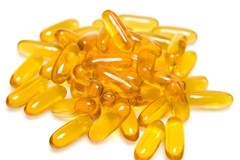History snapshot
New Zealanders' long-standing love affair with cod liver oil

Now, a University of Canterbury researcher says that despite its terrible taste, cod liver oil did actually do some good but the reasons why did not become apparent until the twentieth and twenty-first centuries.
"It is vindicated as a useful food supplement even today as long as manufacturers process and store the fish oils correctly,’’ said Claire Le Couteur.
"Cod liver oil contains vitamins A and D, but this was not known until the twentieth century. People did not know why it helped diseases such as rickets, caused by a lack of Vitamin D.
"The early mixtures probably contained very little vitamin A because it is easily broken down when exposed to the air and light. Vitamin D was much more robust and survived the early crude extraction methods.
"The omega-3 fatty acids in fish oils are now known to have anti-inflammatory properties, but only if the oils are really carefully prepared and are not oxidised. Fish liver oils were manufactured in New Zealand in the late 1930s and early 1940s when war threatened supplies.”
Threatened supply
A factory was set up in Wellington by the Karitane Products Society to supply the oil as a vitamin supplement for baby foods. The fish species included groper, ling, shark, blue and red cod, hake and bass.
The oil did work but the reasons why were unknown for a long time. If the oil was oxidised it would not have had any beneficial effects, and could actually made some people ill.
It would have been an easy medicine to sell—the advertising was persuasive and ubiquitous and, therefore, would have been a popular product for pharmacists to market. They all made their own concoctions with strong flavourings to disguise the fishy taste, Le Couteur says.
Until modern medicines came along, it was a reasonably safe and effective product for many purposes.
Separate commodity
"Cod liver oil made up such a large part of New Zealand’s imported products in the nineteenth century that it was listed as a separate commodity in government statistics. To satisfy public demand, thousands of litres arrived every year in bulk, as well as in an unknown volume as a constituent of many patent medicines,” she explained.
"Encouraged by excessive advertising in daily newspapers by patent medicine manufacturers, physicians and pharmacists prescribed it for many different ailments and parents force-fed their children the unpalatable mixture to help them grow. At a time when there were few effective medicines for any illness, cod liver oil played an important role in the treatment of tuberculosis and other wasting diseases.”
Wartime restrictions on imports in the 1940s saw local production of fish oils in Wellington that lasted until the introduction of synthetic vitamins in the 1960s, eliminating the need for the public to swallow unpalatable cod liver oil.













